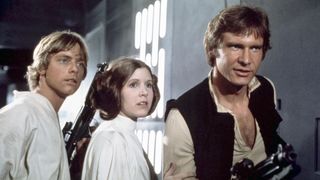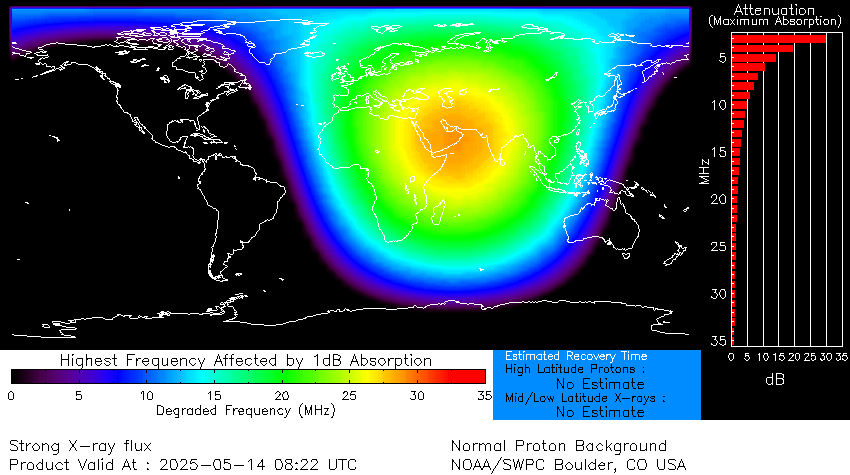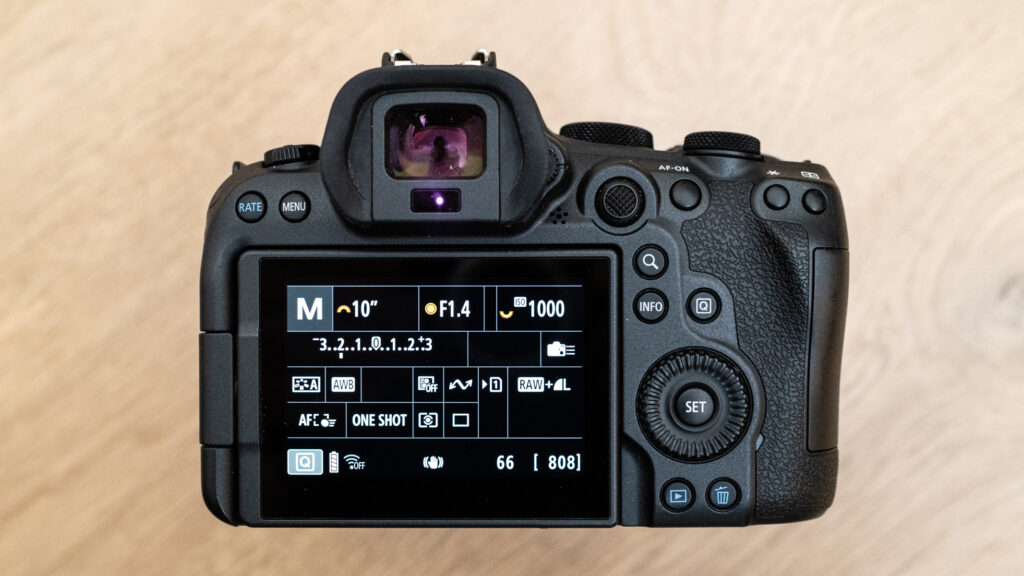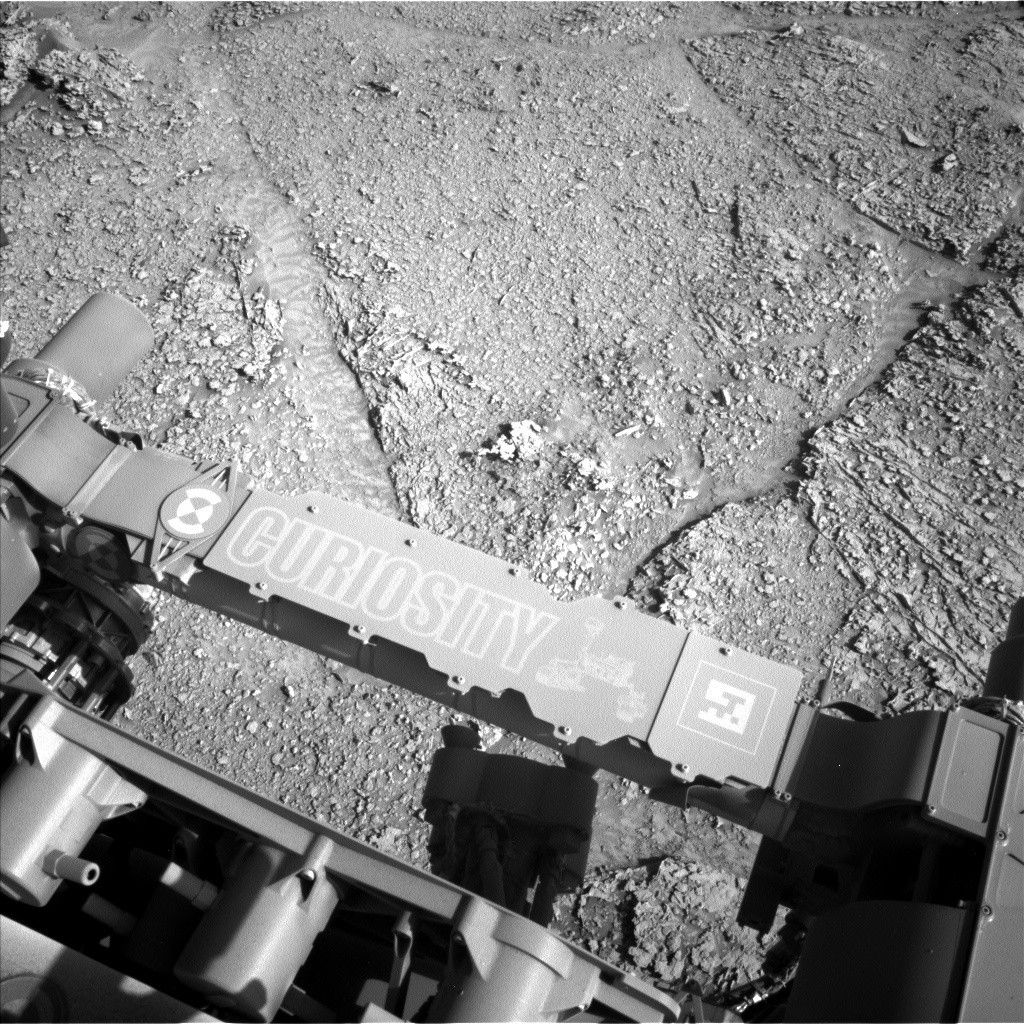All those spaceships, droids, lightsabers, and scoundrels had a big part to play in capturing the imaginations of a generation back in 1977. Even so, there’s a much subtler moment that arguably defines the original ‘Star Wars’ movie better than any other.
Young farmer Luke Skywalker, told by his uncle that he needs to stay on Tatooine for one more harvest, steps outside the homestead to stare at a gorgeous binary sunset. It’s a moment that captures the feeling that your current humdrum existence is preventing you from experiencing the adventure and excitement that might lie elsewhere. The grass is always greener, especially on a planet where all you can see is sand.
We’ll skip past the fact that Luke came within a Wookiee hair’s breadth of signing up for the Imperial military academy. And that John Williams’ majestic score could have turned a weather forecast into ‘Citizen Kane’. Thanks to this perfectly framed moment, the audience can sympathize with a kid who lived a long time ago in a galaxy far, far away. We may have wanted to be Han Solo but we were Luke.
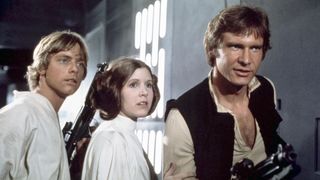
This relatability hasn’t really existed in ‘Star Wars’ since. Ten-year-old Anakin was such a prodigious pilot in ‘The Phantom Menace‘ — his dark destiny so well known — that he never felt as naive as his son. In ‘The Force Awakens’, meanwhile, Rey never wanted to leave Jakku in the first place.
You may like
But the whole premise of ‘Skeleton Crew‘ — in which four kids find themselves lost in a hostile galaxy — is all about taking those first steps into a wider world. They’re so far out of their comfort zones that everything they encounter is new, and for the viewer it’s a welcome chance to remember what life was like when traveling through space felt fresh and new.
Wim, Fern, KB, and Neel are naïve in a way that makes Luke Skywalker, with his womp rats, T-16s, and nascent Force powers, look like the Emperor by comparison. They come from a world called At Attin (named after an Imperial Walker?), and — thanks to the nebula-like “Barrier” that surrounds the planet — have seemingly never seen stars, let alone any wars. Theirs is a life of “safety droids”, homework, and aspiring to become accountants or analysts. Forget the taxation of trade routes in the prequel trilogy; these younglings are exposed to chatter about the “fungibility of multiple currencies”.
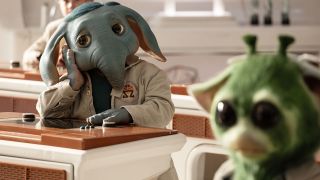
At Attin may be the antithesis of Tatooine’s wretched hives of scum and villainy, but the bubble baths, toolsheds, and beautifully manicured lawns — mown by droids, of course — are just as oppressive for the young heroes. It’s easy to see why young Wim recreates lightsaber battles with his (is this too meta?) very own ‘Star Wars’ figures, dreaming of adventures on faraway worlds, or Fern gets her thrills riding speeder bikes around town. Put simply, it’s prime Steven Spielberg territory.
‘Skeleton Crew’ creators Jon Watts and Christopher Ford have been extremely vocal about how much ’80s movies from Spielberg’s Amblin production company influenced the show — “’The Goonies’ in space” has even become a convenient shorthand for the latest ‘Star Wars’ spin-off.
Back then, Spielberg — along with producer Kathleen Kennedy, now president of Lucasfilm — perfected a successful formula in which ordinary suburban kids found themselves in extraordinary situations. Perhaps they had a friendly alien as a house guest (‘ET: The Extra-Terrestrial‘), saw Christmas ruined by a mob of malevolent little monsters (‘Gremlins’), or went on a treasure hunt to save their small town from developers (‘The Goonies’). These, and a lot of successful imitators like ‘Explorers’, were the epitome of childhood wish fulfillment, as kids (and their parents) recognized the ordinary worlds they called home. It’s one of the reasons they’ve endured for decades.
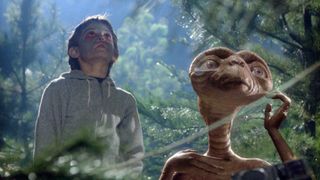
Spielberg’s actual involvement with ‘Star Wars’ has been (officially, at least) limited to a few lucrative points of the gross on ‘A New Hope’, and consulting on key scenes in ‘Revenge of the Sith’. But in the hands of Watts (most famous for directing the Tom Holland Spider-Man trilogy) and Ford, it turns out that kids brandishing walkie-talkies while riding bikes is a natural fit for the universe George Lucas built.
Just as Lucas used real Tunisian locations to give Tatooine a believable, lived-in feel, the fact that At Attin looks so familiar — albeit with a few ‘Star Wars’-y adornments — does a lot of work to ground the story. Parents will also relate to Wim’s dad who, unlike Anakin’s mum in ‘The Phantom Menace’, doesn’t seem convinced that his son leaving on a strange spaceship is a good idea.
Perhaps most crucially, these kids head into space with no baggage. They’re not (as far as we know) cousins of Corellian freighter pilots, or the grandchildren of Sith Lords. The show is also not a prequel. And while the story is set around the same time as ‘The Mandalorian‘, ‘The Book of Boba Fett‘ and ‘Ahsoka‘, it’s free from prior canonical entanglements, Imperial, New Republic, Jedi or otherwise — to Wim, Fern, KB and Neel, everything that’s come before is just a fairytale.
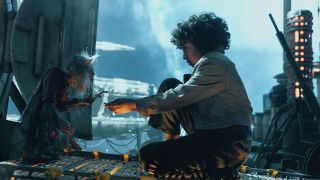
Sure, there are callbacks to earlier stories — the opening pirate assault has loud echoes of the attack on the blockade runner that opens ‘A New Hope’, while power converters are still a must-have accessory — but they’re not pivotal to the plot. Even though we’ve been watching the Millennium Falcon jump to hyperspace for decades, we can relate to the kids’ unadulterated fear as they fly into the literal unknown.
“This is not what the galaxy was supposed to be like,” says one of the space-Goonies, but we’d argue that exploring a blank canvas like this is exactly what the galaxy should be like.
Nobody is ever going to capture what it was like for the soon-to-be fans who queued around the block in 1977 and had their pop culture horizons expanded. But the first two episodes of ‘Skeleton Crew’, with their pleasingly Spielbergian vibes, have a decent stab at hitting an impossible target.
The first two episodes of ‘Star Wars: Skeleton Crew’ are available now on Disney Plus. Subsequent episodes debut on Wednesdays.
